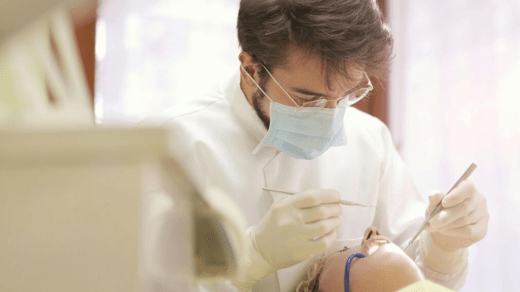When it comes to oral health, understanding when to seek professional dental care is crucial in preventing serious complications. While some dental discomfort can be managed at home, there are times when visiting a dentist is necessary to address underlying issues effectively. Today, we will help you identify the signs and symptoms that require professional attention, ensuring you maintain a healthy, pain-free smile.
Understanding Dental Pain
Dental pain can occur for various reasons, ranging from mild discomfort to severe agony. Understanding the source of this pain is crucial in determining whether professional help is necessary. In some cases, it might be as simple as a piece of food stuck between teeth causing temporary irritation. However, if the pain persists or intensifies, it might indicate a more serious underlying issue that requires attention. It’s important to remember that while some dental discomfort can be managed at home, persistent or severe pain often calls for a professional evaluation.
Common Causes of Dental Pain
There are several common causes of dental pain that individuals frequently encounter. Cavities are one of the most prevalent reasons, as they result from tooth decay and can lead to significant discomfort if left untreated. Gum disease, another common cause, involves inflammation and infection of the gums, which can spread to the surrounding tissues. Additionally, dental abscesses, which are pockets of pus caused by bacterial infections, can lead to sharp, throbbing pain. Recognizing these common causes can help you understand when dental pain might require more than just a home remedy.
Home Remedies for Minor Discomfort
For minor dental discomfort, several home remedies can provide temporary relief. Rinsing your mouth with warm salt water helps reduce inflammation and cleanse the area of irritants. Over-the-counter pain relievers like ibuprofen can also manage pain and swelling.
Applying a cold compress to the outside of your cheek can alleviate pain and reduce swelling. However, remember these methods offer temporary relief and are not substitutes for professional care. If symptoms persist, consult a dental professional.
When to Consider Professional Consultation
While some dental pain can be managed at home, there are clear indicators that professional consultation is necessary. If you experience severe tooth pain that doesn’t subside with over-the-counter pain medications, it’s time to seek help. Likewise, if you notice swelling in your gums or face, or if you develop a fever, these could be signs of an infection requiring immediate attention. Persistent bad breath or an unusual taste in your mouth can also indicate underlying issues. In such cases, visiting a dentist will ensure that any potential problems are diagnosed and treated appropriately.
Dental Procedures for Relief
When professional intervention is required, there are several dental procedures designed to alleviate pain and address the root cause. Root canal therapy is often used for pain caused by infected or inflamed pulp within the tooth. In cases of advanced decay or damage, tooth crowns might be recommended to restore the tooth’s function and appearance.
Like a few other procedures, crowns offer a long-term solution to protect and preserve damaged teeth. Understanding these options can help you feel more informed and confident when discussing treatment plans with your dentist.
Preventative Measures for Dental Health
Taking preventative measures can significantly reduce the risk of dental pain and related issues. Regular brushing and flossing, at least twice a day, help remove plaque and prevent cavities. Using fluoride toothpaste strengthens enamel, making it more resistant to decay. Additionally, maintaining a balanced diet low in sugary snacks and drinks minimizes the risk of tooth decay. Lastly, regular dental check-ups and cleanings are essential to catch any potential problems early and maintain overall oral health.
The Role of Diet in Oral Health
Your diet plays a vital role in maintaining healthy teeth and gums. Consuming foods rich in vitamins and minerals, such as fresh fruits, vegetables, and lean proteins, supports oral health. Calcium-rich foods like dairy products help strengthen tooth enamel, while crunchy fruits and vegetables like apples and carrots can help cleanse the teeth. Reducing the intake of sugary and acidic foods and beverages minimizes the risk of cavities and erosion. Staying hydrated with water also helps wash away food particles and stimulate saliva production, which protects against bacteria.
The Impact of Stress on Dental Health
Stress can have a significant impact on dental health, often manifesting as jaw clenching or teeth grinding (bruxism). This can lead to worn-down teeth, increased sensitivity, and jaw pain. Learning stress-reduction techniques, such as deep breathing exercises and regular physical activity, can help alleviate these issues. Wearing a mouthguard while sleeping can protect teeth from grinding damage. Regular dental check-ups will allow dentists to monitor any stress-related symptoms and provide appropriate solutions.
Importance of Oral Hygiene During Illness
Maintaining oral hygiene is especially important during periods of illness. Conditions like the flu or a cold can increase the risk of oral health issues due to factors like medication side effects and dehydration. Rinsing your mouth with a mild antiseptic solution can help reduce bacteria and prevent infection. Continuing to brush and floss regularly, even when feeling unwell, helps maintain oral health. Staying hydrated and managing symptoms with doctor-approved remedies will also support effective oral care during illness.
Seeking Help for Specific Dental Issues
Certain dental issues require immediate attention to prevent further complications. A toothache, for example, is a common reason individuals seek dental care, as it can range from mild discomfort to severe pain and may indicate an underlying condition. Similarly, cracked or chipped teeth need prompt evaluation to determine the best course of action. A dental professional can assess these issues and provide appropriate treatment to alleviate pain and prevent future problems.
The Importance of Regular Check-Ups
Regular dental check-ups play a crucial role in preventing dental pain and maintaining oral health. During these visits, dentists can identify potential issues before they develop into more serious problems. Regular cleanings also help remove plaque and tartar buildup, reducing the risk of cavities and gum disease. By committing to routine check-ups, you can significantly decrease the likelihood of experiencing unexpected dental pain. Trusting in professional services ensures that your dental health is monitored and maintained effectively.
Cosmetic Dentistry – Enhancing Your Smile
Cosmetic dentistry focuses on improving the appearance of your teeth, gums, and overall smile. The field offers a range of procedures, such as teeth whitening, veneers, and bonding, that can address discoloration, chips, and gaps between teeth. Many dental practices, like The Dental Bar, offer these cosmetic services to enhance aesthetic appeal while maintaining oral health. It’s essential to consult with a dental professional to discuss your goals and determine the best cosmetic options tailored to your needs. Remember to trust in professional recommendations to achieve optimal results while ensuring your dental well-being.
Trusting Professional Services
Trusting professional services is essential when dealing with dental pain. Dentists possess the expertise and tools needed to accurately diagnose and treat a wide range of dental issues. They can provide tailored advice and treatment plans that address the specific needs of each patient. Additionally, professional services offer peace of mind, knowing that your dental health is in capable hands. Whether you’re dealing with a simple cavity or a more complex issue, relying on a dental professional is the best way to ensure optimal care and recovery.
Conclusion
Dental pain should never be ignored, as it can be a sign of underlying issues that require attention. While some discomfort can be managed at home, persistent or severe pain necessitates a professional consultation. Remember, regular check-ups are key to maintaining oral health and preventing dental pain, allowing you to enjoy a pain-free smile. If you’re experiencing any concerning symptoms, don’t hesitate to reach out to a dental professional for guidance and support. Your oral health is important, and taking proactive steps ensures a healthier, happier future.

